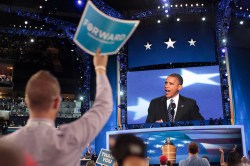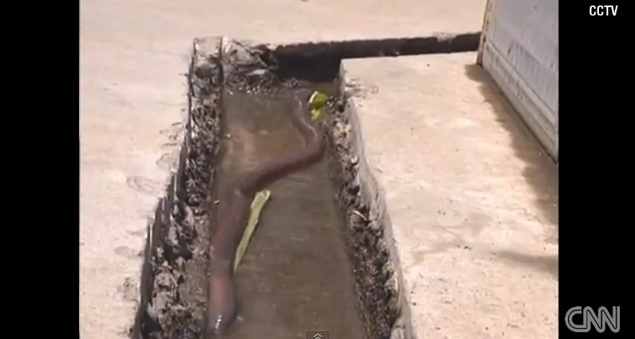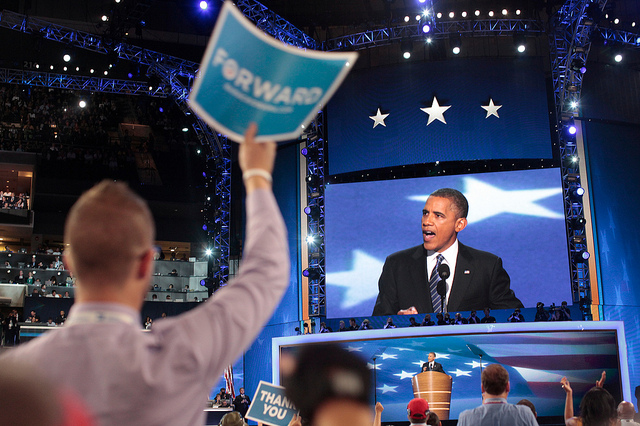
Obama calls on Americans to be citizens. (Photo by NewsHour.)
I was only half-surprised that Obama mentioned climate change in his convention speech — Romney teed him up for it — but I was pleasantly surprised at how sharp and unequivocal he was. He did something he rarely does: called out and shamed Republicans for their unconcern. It was a banner night for us climatespotters. Do I think it signals any big shift in administration climate strategy or policy? Not really. But I hope it’s at least the beginning of a more frank, mature public conversation.
As for the energy portions of the speech, they were not surprising at all. He’s said it all before, many times, on the trail: all of the above, blah blah. If there was anything that struck me about his tone it’s that he rushed past the “we’ve drilled tons of oil!” part and leaned on the next bit: “I will not let oil companies write this country’s energy plan, or endanger our coastlines, or collect another $4 billion in corporate welfare from our taxpayers.” As with the rest of his speech, he seemed to be drawing the sharpest possible contrast with Romney (“two fundamentally different visions for the future”). That can really work on energy, which is a wedge issue that breaks his way, so I wish he’d do it more often.
The parts of the speech I found more intriguing — and, in a way, more relevant to the big problems of climate and energy crisis — had to do with those “visions for the future.”
As I and others have said many times, climate is a “wicked problem.” It’s difficult to know even how to define it, where it begins and ends, what kind of problem it is. There is no “solution,” only a series of meliorative actions taken in what is and will remain a fundamentally new set of circumstances. It requires bold and broadly coordinated action.
Many of humanity’s 21st century problems will be wicked. Here’s what Obama said will be required to tackle them: “common effort, shared responsibility, and the kind of bold, persistent experimentation that Franklin Roosevelt pursued during the only crisis worse than this one.”
The thing about “bold, persistent experimentation” is that it requires a certain basic level of trust — a sense that we’re in it together, that we recognize a common challenge, that we’re not trying to exploit one another or evade burdens, that we are part of a social contract. It requires citizenship. Here’s how Obama put it:
We honor the strivers, the dreamers, the risk-takers, the entrepreneurs who have always been the driving force behind our free enterprise system, the greatest engine of growth and prosperity that the world’s ever known.
But we also believe in something called citizenship — citizenship, a word at the very heart of our founding, a word at the very essence of our democracy, the idea that this country only works when we accept certain obligations to one another and to future generations.
…
We, the people recognize that we have responsibilities as well as rights; that our destinies are bound together; that a freedom which asks only, “what’s in it for me?”, a freedom without a commitment to others, a freedom without love or charity or duty or patriotism, is unworthy of our founding ideals, and those who died in their defense.
As citizens, we understand that America is not about what can be done for us. It’s about what can be done by us, together, through the hard and frustrating but necessary work of self-government. That’s what we believe.
That to me is both a beautiful bit of speechwriting and a fundamental truth.
Now, how does this sense of in-it-together citizenship mesh with the occasionally sharp distinctions drawn earlier in the speech? And how does my celebration of this sentiment jibe with my own sharp-elbowed partisanship?
Here’s how I see it: The modern U.S. conservative movement has opted out of that sense of citizenship and civic responsibility. It has become a tribal, revanchist force for the preservation of demographic privilege. It does not acknowledge the legitimacy of the president. It rejects the social-democratic consensus in place in every other wealthy democracy (“Europe!”). It rejects the consensus standards of science and journalism. It does not recognize many of the people and groups with which it shares a country as “real Americans.” I know I overuse this quote from Thomas Mann and Norm Ornstein, but nobody has described better what the GOP has become: “a resurgent outlier: ideologically extreme; contemptuous of the inherited social and economic policy regime; scornful of compromise; un-persuaded by conventional understanding of facts, evidence, and science; and dismissive of the legitimacy of its political opposition.”
It’s not that Obama or anyone else thinks Republicans must become Democrats or liberals to be citizens. It is simply that they must regain their sense of citizenship, their sense that adherence to a shared set of norms and willingness to compromise are what make a society function. They must come in from the cold.
It’s not just the right, of course. To coordinate, to accept risks, to share costs and benefits, to move together into the unknown with resolve, we all need to recapture that sense of civic spirit and common purpose. But in U.S. politics today, there is a distinct outlier. Bringing the American community back together must begin with identifying that outlier and subjecting it to social disapprobation. In his speech, Obama rather deftly attempted to do both.



